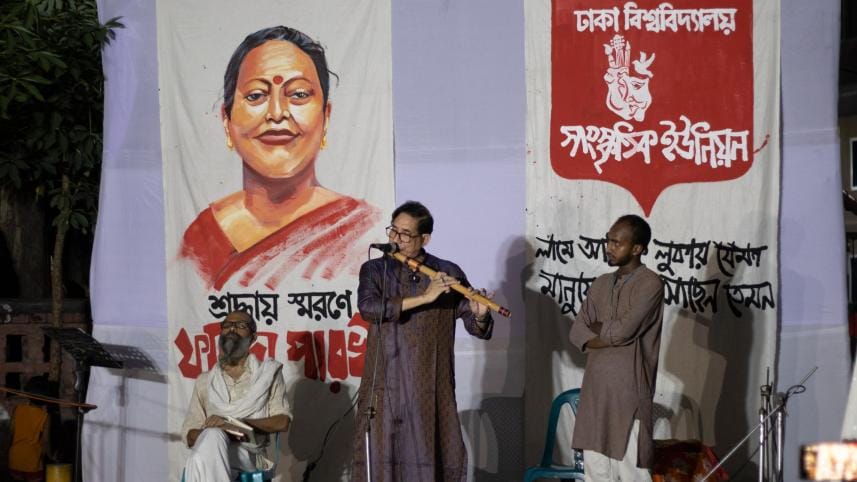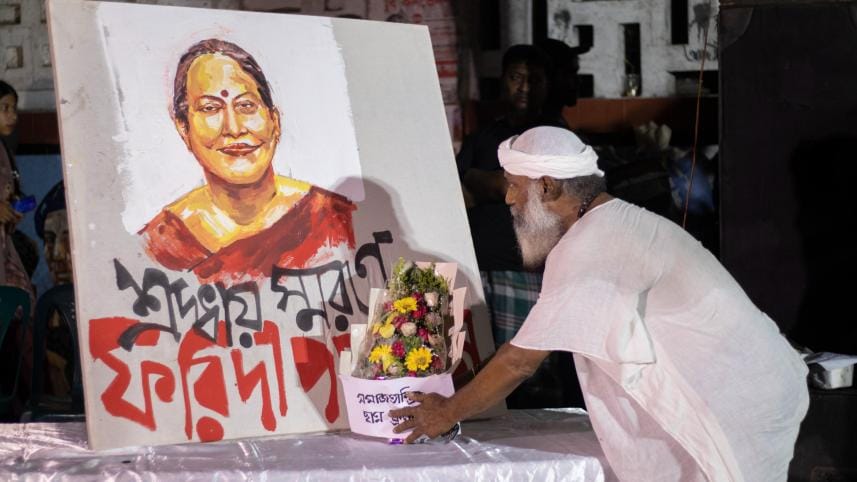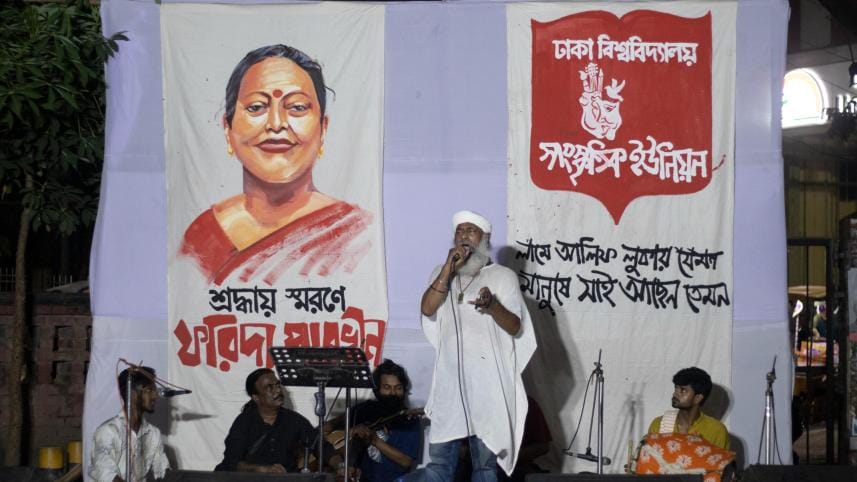‘Shomoy Gele Shadhon Hobena’: Honouring the legacy of Farida Parveen

It was only yesterday that the nation watched as harmless old fakir was dragged away, lured by coaxing words, while men in gloves ignored his pleas and held him down like a disobedient animal before shaving his head – a disturbing violation of autonomy and human rights. In today's climate, where such behaviour is displayed, encouraged, and even defended, going ahead with an event celebrating music, Sufism, and Baul sangeet was a necessary act of defiance.
Farida Parveen, the renowned contemporary vocalist whose name is almost synonymous with Lalon sangeet, passed away on the 13th of this month after a prolonged illness. In a commemorative evening titled "Sroddhay Smarane Farida Parveen", held on September 25, the Dhaka University Cultural Union arranged a heartfelt tribute filled with soulful voices that echoed through the open air of TSC as people from all walks of life listened in awe and quiet remembrance.

Like Lalon, Farida Parveen's life was one of constant struggle and resistance. The core of Sufism is to look beyond caste systems and man-made religions that create division and to embrace the broader humanity within us. However, such secular ideals were not always appreciated and were even deemed blasphemous by many religious extremists. Farida Parveen played an important role in preserving, normalising, and popularising Lalon sangeet for the rest of the world.
The show began at 5 pm, with students taking the stage to tune their flute, kartal (metal cymbals), dotara, and dhol. Her influence permeated every speech and performance as current students reflected on growing up with her music, their voices heavy with grief. Ahmed Abrar of DU's 103rd batch opened the evening with "Khachar Bhetor Ochin Pakhi" — (Look, how a strange bird flits in and out of the cage!)

Lalon often described the soul as a bird confined within the body's cage. In his gentler view of death, the soul is never lost, only set free. For decades, Farida Parveen's voice carried those words with living conviction. Through the Ochin Pakhi Foundation, she left another gift for generations to come—a haven where children can discover Lalon's songs and find a home to nurture them.
Alongside the students' renditions of Lalon Geeti, third-year student Faiza Fairuz Rimjhim performed Farida Parveen's celebrated interpretation of Jasim Uddin's poem "Rasul Naame Ke."
Soon after, the audience was honoured by the presence of Gazi Abdul Hakeem, master flautist and husband of the late Farida Parveen. For decades, her voice and his flute were inseparable; partners in life and in music, giving Lalon's songs both soul and dimension.
During his speech, Gazi Abdul Hakeem revealed that after Parveen's passing he had nearly laid down the flute for good. He confessed he had not even wanted to attend the tribute, yet the memory of her janaza held in that very place drew him back. Each time he considered abandoning music, he remembered his wife's lifelong fight to keep it alive. Surrendering, he felt, would mean letting darkness win over melody – "Shur-Oshurer Juddhe Oshurer Joyi Howa"; and so he chose, thankfully, to keep playing.

He followed with a haunting performance of "Shomoy Gele Shadhon Hobena" on the flute – the very song his late wife often chose to close her performances. Concluding his tribute, he spoke softly, asking the audience to keep him in their prayers and to wish him continued good health.
The evening became not only a celebration of Farida Parveen's enduring legacy but also a reflection on music's history and its present struggles, Enriched by the insights of veteran philosophers, researchers, and musicians. Many of these artists have witnessed firsthand the slow drift of music toward commodification and commercial gain.
Lalon sangeet, rooted in the dawn of industrialisation and predating both modernism and capitalism, began as a purely oral tradition. Songs passed from lips to ears beneath open skies and under trees; rarely written down, never claimed as property. Whereas now, even these songs are getting shorter, down to seconds, into bite-sized, consumable pieces to feed the deteriorating attention span of the masses.
Researcher and cultural thinker Arup Rahee cautioned against the quiet erosion of depth in our traditions. He observed that, in a world where the bourgeoisie reduce rich legacies to surface-level labels, it becomes vital to revisit our cultural bedrock. Western definitions, he argued, are ill-equipped to hold the weight of our histories, and forcing those frameworks upon us is not only careless but profoundly misleading.

Lalon's words and Baul sangeet, intriguingly, crossed borders long ago. Though not fully appreciated in his own subcontinent, his philosophy has inspired many Western poets and artists. One striking example is Allen Ginsberg's "After Lalon", a poem in which Ginsberg laments his inability to live by the ideals the mystic preached.
The tribute continued past 9:30pm, with the audience gradually dispersing as Arif Baul, Pagla Babul, Eliza Putul, Dolly Mondol, and Akash Gayan performed alongside many others.



 For all latest news, follow The Daily Star's Google News channel.
For all latest news, follow The Daily Star's Google News channel.
Comments